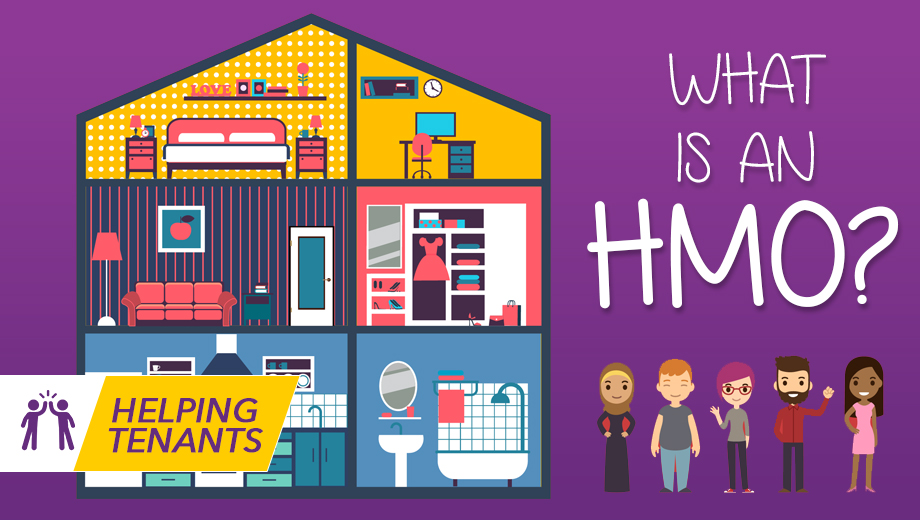I’m going to talk about HMOs. HMOs are Houses in Multiple Occupancy.
Typically that would be what, most of you might know as student accommodation, where you have multiple students coming on a course at university, all sharing a house.
It’s not just students, some professionals will do it and also workers that might be working on construction sites, etc.
HMOs are one of the strategies that will certainly produce a much higher income for you, and there are lots more things you have to put in place and get right for the HMO strategy.
For example, if you have a HMO, so a House in Multiple Occupancy, you might have 3, 4, 5, 6, 7, 8, 9, 10, etc. bedrooms rented out.
Once you get to a certain number of bedrooms and a certain number of families renting, the local authority expects you to license the property.
Licensing is effectively a cost to you, but it means that they will come and inspect the property and make sure it meets a certain safety standard regulation. A lot of those safety standards are about personal safety, fire regulations and things like that, and rightly so, you need to put them in place for when there are multiple people living in a house of different families.
There are different types of licensing.
Once you get to that certain number, you have to have a license. It’s called mandatory licensing. There are certain councils that decided that certain areas they want to license because there might be too many HMOs in that area and they want to restrict the number of HMOs in the area because it’s turning into more of a student area than a sort of a rounded family area. And then there’s also mandatory licensing, which is where the council said, “This particular area, we are going to license everything regardless of whether it’s a HMO, a buy-to-let,” etc, because there may be, again, too many rentals or there may be troubles and things they want to keep an eye on.
All of these things are licenses that you have to get involved with.
Now I’m going to talk really about just the mandatory licensing, and I would say if you’re going to do HMO and it doesn’t fall into the licensing category, you should still think about that. If I, for example, I’m doing a four bedroom HMO in a particular town that doesn’t fall into mandatory licensing, there may be a time when the council decides that they’re going to want to raise some more money and charge the landlords to license their properties, and then you suddenly have to be licensed.
Now, it’s harder and more expensive to retrofit things after the event, after you’ve already got it rented out and people living in it, than to do it at the beginning. So I suggest that if you’re going to do it, then probably a good idea is to meet the standards anyway and put in the things that are required.
For example, one of the things that is required is that smoke alarms are fitted in every single room. One of the reasons behind that is because if you have a family let, a buy-to-let and the fire alarm goes off, then mum or dad, will wake each other up plus other family members and they say, let’s get out of the house quick, there’s a fire.
Whereas in a HMO, the individuals don’t necessarily know each other, so they hear the alarm and just think about themselves and get out of the room and the others may still be in the house. So the alarms must be in every single room that will sound so that people can be woken.
I’m not going to go into all of regulations and everything about HMO because that is something that will take a good day or two.
This is just an overview.
HMOs in their own right will generate you much more income than a standard buy-to-let in general.
If you are going to go for a four or a five-bedroom HMO, you are going to generate more income.
If I were to do a small HMO, three, or four bedrooms, I would want to generate, after bills, after everything’s paid out, a minimum, and this is also if I’m stress testing it, so I’m using high interest rates, a minimum of somewhere in the region of £500 a month. In reality, five-bedroom HMOs can earn £1,000 or more a month in your bank account, and that’s why it becomes more attractive.
Now, it is more attractive and you earn more, but there’s a lot more you’ve got to put into it.
You’ve got to do a different type of refurb.
You’ve got to meet the standards for the licensing.
You’ve got to put in things like fire doors, fire alarms everywhere, etc, etc.
All these things cost more money.
You have to have certain signage and things up and you’ve got to run that risk assessment.
You’ll also have to provide the property furnished.
You’ve got to buy the beds, the settees, the TVs, the desks that they work at, all the pots and pans in the kitchen, knives and forks, etc. Fridge-freezers, all those things are an expense to you for you to furnish the house initially.
And then you also got to think about what are you going to do for the bills.
Now, if you’ve got five people, six people sharing a house, gas, electric, broadband, water council tax, all those kinds of things… You can make the individuals say it’s their responsibility, they have to pay for them. A lot of student landlords do that.
They just say, “Here’s a room, pay for your bills yourself.” I don’t, I prefer to say all the bills are included, so I just add that to the cost of the room.
I may also include cleaning so that I have the communal areas, things like the kitchens, the hallways, and the bathrooms every week or two are cleaned by a professional cleaner.
This is to keep the house nice and clean and tidy. And this helps, really with everybody getting on as well, because if you are already paying for all the bills as part of your room, then there’s no argument if somebody’s not there for a couple of days or somebody’s working away or somebody’s working from home, they’re not saying, “Well, you are using more gas and electric heating than I am. You are using the cooker more. You are using more electricity, so I shouldn’t have to pay as much of my bill as you do.”
By you paying that as a landlord and just including it in the room rent, then that takes away that kind of problem that might happen with those arguments.
Broadband is very important, now. Broadband is one of the things that you must have.
Everybody uses Wi-Fi, now, it’s pretty much a standard thing. And then of course, if you are doing student lets, there are different rules for council tax for example, if everybody’s a student, then the property becomes exempt, from council tax, as students are exempt from council tax.
Now, there’s also a lot more management involved in room lets.
Students are one thing, but if you are doing professionals, they may come and go, they may just come to the area for a couple of months for work and then they may go somewhere else. You have a lot more changeovers and handover of clients. In the majority of HMOs that I have, they tend to stay on average for about a year. Maybe I’ve got some that are longer than that, but on average about a 12 to 18 months, and you’re looking at a new replacement tenant after that.
Also, for HMOs, you’ve got to make sure that you are going to get replacement tenants quite quickly because you don’t want rooms empty.
There are certain calculations that you do that show if a certain number of rooms being rented it covers all your costs and it’s a break-even point. And then each room rented after that, becomings profit.
So you need to look at your calculations very clearly.
The cost of buying a HMO is also normally a little bit more than a standard buy-to-Let, because you’re buying a bigger house, you’re buying something that’s at least a three or four bedroom house and then you might be converting it in some way to more bedrooms. You might be making five or six bedrooms out of it. That’s all much more cost. The purchase price, the refurb costs, the do-up costs, the furnished cost that cost you a lot more money and all those factors need to be included in your costings.
However, HMOs can be very lucrative and work very well.
If you think you have a particular figure that you want to earn to maybe get you to a different situation in life out of work,
maybe not work,
maybe just work less and you might have a certain number.
Let’s say you want to earn £3,000 a month, then if you’ve got a HMO that’s generating a £1,000 a month, then you only three HMOs.
So it’s a lot less than buying perhaps in that scenario 10 buy-to-lets, so you can get to your figure quicker.
Remember though, there are more costs involved and there is a lot more to do and you must have a very, very good management agent in place to help you with the management of those properties. People coming and going, sorting out any differences people have and the way that you manage the way those people live together.
For example, I know one agent that will encourage cheese and wine nights or pizza nights.
He will come into the property when the tenants are new to get them to talk and to know each other and buy pizzas and sit around for an hour and have a chat with everybody and do that regularly to start with. And then less so regularly later on, they then take it on themselves and the tenants will probably carry on chatting and doing those kinds of things themselves.
That’s a great way to work because you want your tenants to be happy, you want them to be friendly and to get on with each other and to be in a lovely place and keep your property also up together.
The mortgage for HMO isn’t much different to a buy-to-let. You’ve just got to stipulate that’s what you’re going to use it for.
Insurance is the same, you’ve got to make sure you tell your insurance company that you’re using it as HMO. Other than that, there isn’t anything really big difference.
If you want to invest in slightly more expensive areas where you can’t make it work as a buy-to-let, HMO may well be the best thing to do.
Make sure you do your due diligence and make sure there is a lot of demand for rooms in that area before committing to a HMO.
I’ve recently had to help somebody out who was sold, through a sourcing agent, a HMO in a town. Once they got it, there was just not enough demand to fill the rooms.
They had a six-bedroom HMO, and they had two rooms filled, and the others were empty.
They just weren’t filling because the demand wasn’t there.
There weren’t enough people looking to rent rooms.
You’ve got to get that right before you get into that situation. Otherwise, you are stuck in that situation.
Those two rooms that they were renting out weren’t even covering the bills, so it was costing them.
I had to help them restructure and do something different with that property.
So here’s a quick overview of HMOs.
Hopefully, that’s given you a nice little insight.
Best regards Neil

